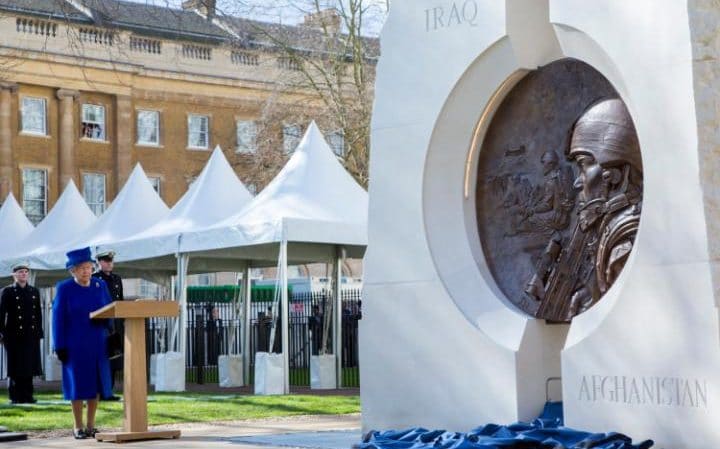2017-03-10 18:46:00
e has never been one to shy away from offering a forthright opinion.
But a candid passing remark by the Duke of Edinburgh may inadvertently change the face of London’s newest monument, after he told the artist he could not see its lettering clearly.
The Duke had accompanied the Queen around a landmark new memorial to Britain’s military and civilian forces who served in Iraq and Afghanistan from 1990 to 2015.
But at the grand unveiling, he mentioned that the lettering, carved into stone, was not easy to read and suggested it could be darker.
Paul Day, the artist behind it, said he was now considering “re-addressing” the sculpture, conceding the “aesthetic decision” could be re-examined in the face of the Duke’s opinion.
The memorial was given the seal of approval by the Queen, he added, who admired it at length during a ceremony in front of dignitaries in Victoria Embankment Gardens, London.
Speaking afterwards, Day said: "Her Majesty the Queen seemed very enthusiastic about the memorial, if I may be permitted to say so.
"The Duke commented on the fact the lettering wasn't necessarily clearly visible enough. It could be darker.
"That's an aesthetic decision we might readdress afterwards, but we'll see.”
He added: "Obviously when one unveils a project that's been imagined and worked out on paper in a sculpture studio, sometimes you live with something and then come back to it and say 'OK perhaps this needs doing'."
The memorial includes a two-sided bronze medallion to represent the two facets of military and civilian work in Iraq and Afghanistan.
It was unveiled by the Queen yesterday in a small ceremony following a spectacular main service in Horse Guards Parade, attended by 2,500 invited guests including the Prince of Wales and Duchess of Cornwall, the Duke and Duchess of Cambridge and Prince Harry, who performed a reading.
For some military families, proceedings were somewhat overshadowed by the presence of one other public figure: Tony Blair, the former Prime Minister they hold responsible for entering the Iraq war.
Some, including Gerry Cartwright, whose son James died in Basra in June 2007, said Mr Blair’s ticket could have gone to a member of the public who had lost a loved on in the conflict.
Bereaved families have previously complained they had not been invited to the ceremony despite their sacrifice, amid claims there was simply not enough space.
Tracey Hazel, whose son Ben Leaning died in Iraq in April 2007, said: “It has been proved with the Chilcot that it was not worth it. I obviously think somebody else should have had [Mr Blair’s] ticket, like one of the parents.”
Prime Minister Theresa May and Labour leader Jeremy Corbyn attended, along with former prime ministers David Cameron and Sir John Major.
Despite the long list of royal, political and military grandees, all eyes were on one young man at the unveiling ceremony: the little boy who was supposed to hand the Queen her flowers but was overcome by events.
Alfie Lunn, aged two, became the star of the show, entertaining dignitaries with a lively appearance alongside his mother and father, who both served in the armed forces.
The family were chosen to attend the memorial because of their deep involvement with the armed services, with father Sergeant Mark Lunn, 29, receiving the Military Cross for his actions during a firefight in Basra, and mother Corporal Michele Lunn deployed in Afghanistan in 2011-12.
The toddler had been chosen to present a posy of flowers to the Queen, but raised smiles as he wriggled in his mother's arms instead.
When he was put down on the floor for his big moment, he swung around and tried to sit on the floor as the Duke of Edinburgh looked on in amusement.
Corporal Michele Lunn, Alfie's mother, said afterwards that the Queen had been "very understanding" thanks to having children of her own, carrying on calmly despite the threat of a toddler “meltdown”.
"They're so unpredictable children, we tried our best,” she said. “He was fine up until a few minutes before the Queen arrived."


